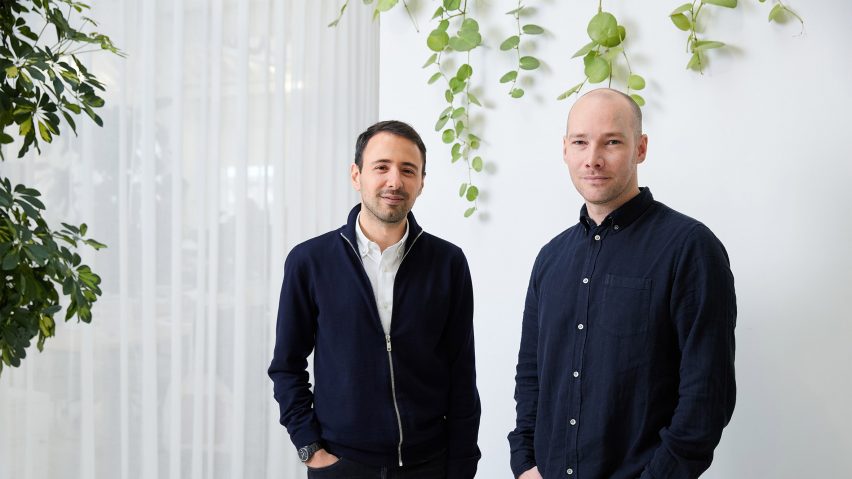
Artificial intelligence "will empower designers" say Clippings co-founders
Technology will allow architects and designers to spend more time designing and less time doing admin, according to Adel Zakout and Tom Mallory of furniture-sourcing platform Clippings.
The duo, who this week announced the sale of their business to US samples service Material Bank, said that architecture and design is "is one of the few remaining sectors that really has not been touched significantly by technology."
But this is finally changing, they added.
"I believe that in 10 years, interior designers and architects will be doing more designing," said Zakout (above, left), who co-founded the London-based platform with Mallory (right) in 2014.
"Today, interior designers and architects are spending 60 to 80 per cent of their time just doing admin like emails, Excel sheets, putting quotes together and just managing stuff," he added.
"Unfortunately, that's part of the job today because technology hasn't caught up," he said. "Technology has not enabled them to save time and focus on where they can add value. But in 10 years time, designers will be able to design more" thanks to technology.
Pandemic "accelerated" way of thinking about technology
Mallory added that the coronavirus pandemic has "drastically shifted" attitudes to technology in the sector.
"The pandemic certainly has accelerated the way people are thinking about distribution channels and how technology can be a part of it," he said.
Clippings handles the selection, purchase and delivery of furniture, lighting and other products for architecture and interior projects, while the brand's new parent Material Bank offers North American architects overnight delivery of a wide range of material samples.
Services like these will allow architects and interior designers to focus on their design work, the duo believes.
AI "is incredibly powerful"
They disagreed with claims that artificial intelligence will make designers redundant.
Two years ago, New York designer Sebastian Errazuriz warned that AI would eliminate the majority of creative jobs in architecture.
"I think it's important that architects are warned as soon as possible that 90 per cent of their jobs are at risk," he said.
But Zakout said: "I actually think it'll be the opposite. I think artificial intelligence will empower designers. I think that AI, especially for repetitive work, is incredibly powerful. But fundamentally, the creative process that designers go through will be quite difficult to replace with AI."
"I do believe that AI will have a huge impact on the process," he added. "It'll make things like discovery, the procurement process, matching the products in the general workflow much easier and quicker."
"I think technology will do a lot to enhance the process but I don't believe that I will replace the designer."
Covid-19 forced brands to adopt tech
Zakout agreed that the coronavirus pandemic forced furniture and lighting brands to come to terms with technology.
"A lot of brands woke up last March and realised that their whole distribution channels had been shut down," he said. "Their whole method of distributing their products, marketing, selling their products, was no longer available."
This led them to embrace digital solutions for the first time, he added.
"There has been a drastic mentality shift," he said. "Businesses like Herman Miller [now MillerKnoll] are starting to sell directly to customers," via the Herman Miller Professional portal that it built in conjunction with Clippings.
"So I think things are accelerating. Covid has definitely been a bit of a trigger. It's been a kick for some brands to really move on with their plans."